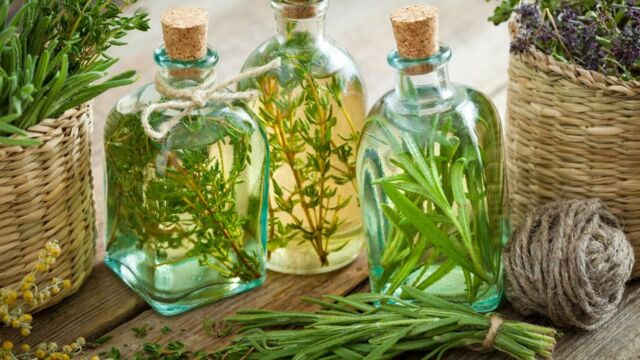You'll find thyme in the form of a dry herb or powder or freshly picked, in most kitchens. However, thyme is also used as medicine in the form of herbal teas, fresh infusions, and essential oils you inhale. Some people even use it in compresses. In fact, thyme is a natural remedy for (almost) all ailments.
Discover our latest podcast
It's been around for millennia and stuck around in our everyday lives for both its taste and its medicinal properties. The current trend of going back to nature has put thyme and its countless virtues in the spotlight. There are about 300 varieties of thyme, ranging from lemon thyme to common thyme. The latter is the most commonly used.
1. To soothe a cough
One of the most recognized virtues of thyme is its ability to relieve respiratory ailments and soothe coughs. Combined with appropriate medical treatment, it can also help fight bronchitis, and even COVID-19, by relieving symptoms. To achieve this, you can make an herbal tea by letting a few branches steep in hot water for several minutes, or by pouring 3 drops of thyme essential oil into a cup. You can also ingest it through inhalation by dropping 2 tablespoons of fresh or dried thyme in a bowl of boiling water, then inhaling the vapors of the mixture while standing over the bowl, with your head under a towel, for a few minutes.
2. To fight against dental plaque
Thyme is also known to effectively fight cavities, thanks to one of its components, thymol, which has powerful antiseptic and antibacterial properties. Used as a mouthwash or gargle, it destroys pathogenic bacteria present in the mouth and thus fights dental plaque and bad breath. For optimal and 100% natural oral hygiene, you can simply incorporate thyme into your weekly routine by infusing 5 grams of dried thyme in 100 ml of boiling water and rinsing your mouth frequently with the cooled mixture.
3. To purify combination and oily skin
Historically, thyme has been used to disinfect and help heal superficial wounds and skin conditions. Thanks to its antibacterial and antifungal properties, it relieves minor wounds, cuts, burns, irritations, and even fungal infections. Thyme is also used more and more often in cosmetics, such as the H2O At Home Balancing Serum (£ 29.50), which is great for oily skin, for its purifying properties. This antioxidant also helps reduce the appearance of wrinkles.
4. To improve digestion
The benefits of thyme also extend to the digestive system. In fact, this incredible little aromatic plant in of the most beneficial herbs for digestive support, again, thanks to the antiseptic and anti-inflammatory action of thymol. Thyme infusions can therefore also effectively relieve common digestive disorders such as gastroenteritis, gastrointestinal infections, infectious diarrhea, indigestion, etc.
5. To fight stress
Thyme has the power to soothe the body, as well as the mind! Carvacrol, another one of its components, acts on the nervous system and causes the effect of a natural tranquilizer, making thyme a natural anxiolytic. So, people who suffer from stress and anxiety can supplement other techniques and treatments with thyme to benefit from its relaxing effects. Are you going through a stressful time and need some relief? Thyme tea, 1 to 2 grams of dry leaves infused in 150 ml of hot water, will help you relax. Do not hesitate to drink several cups a day to benefit from its effects.
Photo credits: Ira Rajovic















